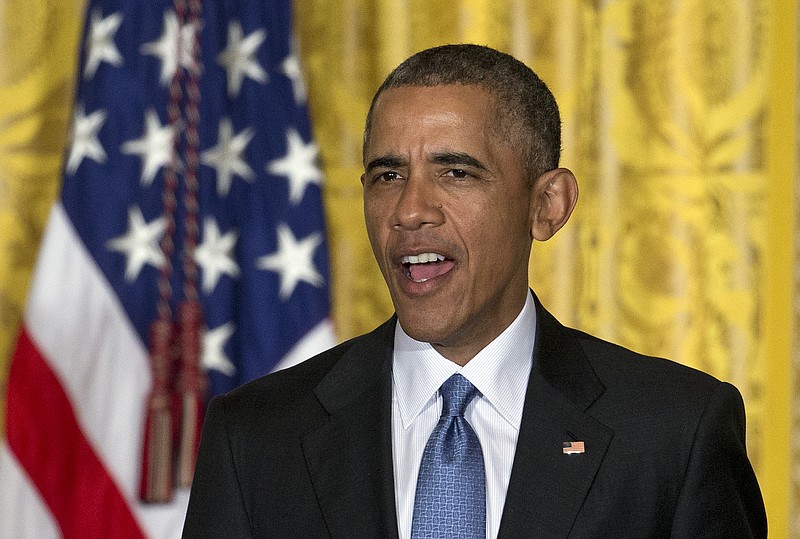WASHINGTON (AP) - The Obama administration is tightening travel restrictions on Europeans and others who have visited Iran, Iraq, Syria or Sudan in the last five years. At the same time, officials say the new rules might not apply to travelers in certain occupations whose travels were for business.
Questions and answers about the visa-free travel program and the new rules:
___
HOW CAN PEOPLE COME TO THE U.S. WITHOUT A VISA?
Under the Visa Waiver Program citizens of 38 countries, mostly in Europe, are generally allowed to visit the United States without applying for a visa. Before they travel they have to provide the U.S. government with biographic data, including information about what other passports they may have and details about their parents, using the Electronic System for Travel Authorization, or ESTA.
If the Homeland Security Department approves an ESTA application, the traveler can be admitted to the United States with only a passport. Anyone who isn't approved for visa-free travel can still apply for a visa to come to the U.S.
___
WHAT CHANGED?
In December Congress passed a bill to amend the Visa Waiver Program and bar people who had traveled to Syria, Iraq, Iran or Sudan in the last five years from visiting the United States without a visa. People who are duel citizens of Iran, Iraq, Syria or Sudan are also now required to have a visa. Those countries are either hotbeds of Islamic State activity or are considered by the United States to be state sponsors of terrorism.
The new rule doesn't block people from coming to the U.S., but it does mean that they have to be interviewed at a consulate or embassy through the standard immigration process.
___
ARE THERE ANY EXCEPTIONS?
Yes. The Obama administration said Thursday that some people who were in certain occupations may still be allowed to travel to the U.S. without a visa. People who traveled to those countries as journalists, for work with humanitarian agencies or on behalf of international organizations, regional organizations and provincial or local governments can ask the government to waive the new visa requirement. People who have traveled to Iran since July 14, 2015, or Iraq for "legitimate business-related purposes" can also ask to come to the United States under the visa waiver program.
The Homeland Security and State departments both said Thursday that waivers and exemptions would be applied "on a case-by-case basis."
The State Department described the new visa requirement for most travelers who are either dual nationals or have been to the four countries as an "inconvenience" that won't affect the vast majority of European travelers.
___
WHAT PROMPTED THE CHANGE?
Lawmakers moved to tighten the rules governing visa-free travel after the terrorist attacks in Paris. New rules about who can use the program approved by Congress in December are intended to block Europeans who have fought for the Islamic State group and are likely to commit jihadi violence from entering the United States.
State Department spokesman Mark Toner said the change reflects a concern about "European fighters returning from Syria or Iraq or elsewhere and then trying to come to the United States via visa-free travel. It's a recognition that threat exists and an attempt to add another layer of security."
___
DOES THIS IMPACT AMERICANS HEADING TO EUROPE?
It could, if Europe introduces reciprocal action against U.S. citizens. In an open letter last month, the European Union's 29 ambassadors in Washington warned against a "blanket restriction" on travel to certain countries that it said would unfairly target innocent businesspeople, journalists and aid workers, as well as dual nationals.
Introducing this approach toward the 13 million Europeans who visit the U.S. each year "could trigger legally mandated reciprocal measures, and would do nothing to increase security while instead hurting economies on both sides of the Atlantic," the ambassadors wrote.
___
IS THERE ANY POLITICAL FALLOUT?
Some congressional Republicans immediately decried the move, saying it circumvented the will of Congress.
House Homeland Security Committee Chairman Michael McCaul said lawmakers specifically discussed the exemptions the administration announced Thursday and opted not to include them in the legislation.
"The Obama administration is blatantly breaking the law, a law the president himself signed," the Texas Republican said. "This is not a difference of opinion over statutory interpretation. It is a clear contradiction of the law and the agreement we reached with the White House. President Obama is again putting his relationship with Iran's supreme leader over the security of Americans."
